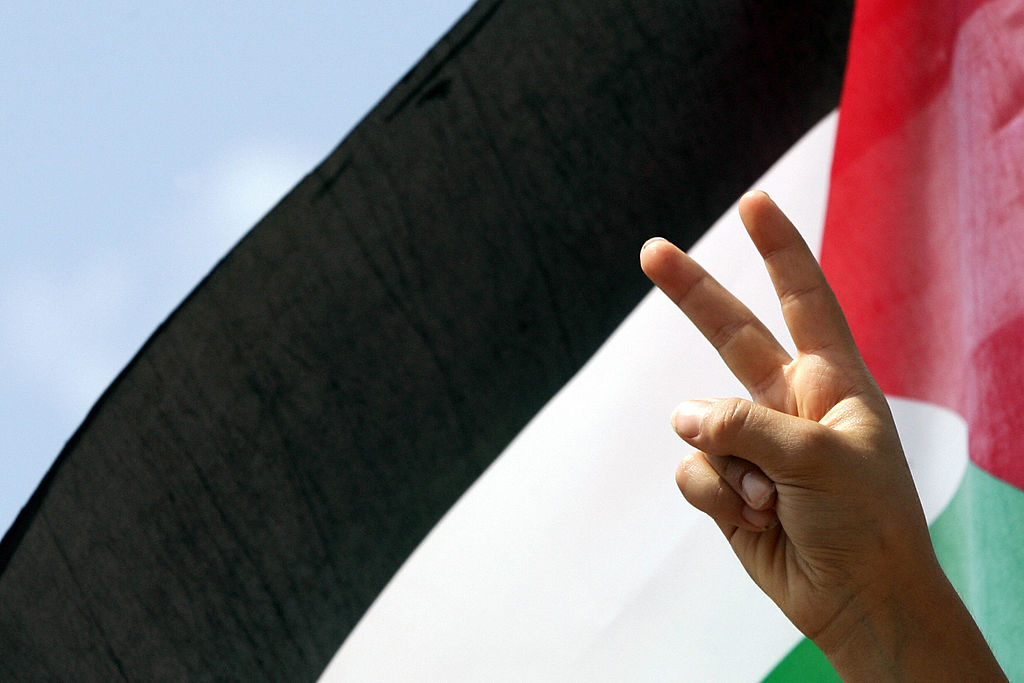GCSE and A level assessments. Enforcing social distancing. Catch-up provision for pupils who fell behind during lockdown. Mental health support. Behavioural issues. Headteachers have more than enough to worry about right now. The conflict between Israel and Palestine? This one, at least, can be filed under ‘beyond my pay grade’. Or perhaps not.
Should pupils be able to wear lanyards that show the Palestinian flag? Or display pro-Palestinian posters? Some see engaged teenagers exercising their right to free expression; others a stoking of racial tensions. Getting the balance right, particularly in a large, ethnically diverse school, is not straightforward.
Mike Roper, headteacher at Allerton Grange school in Leeds, faced this problem head on. When pupils began displaying the Palestinian flag, he urged discretion and warned that some may see the flag as a ‘call to arms’ or that it might be ‘seen as a message of support for anti-Semitism’.
The ensuing outrage was, perhaps, predictable. Roper was accused of ‘wild Islamophobia’ and seeking the ‘complete erasure of Palestine’. Former Guantanamo detainee Moazzam Begg declared: ‘Not even Apartheid Israel says that’ (about the Palestinian flag). Next came the petition calling for Roper’s immediate resignation and, for good measure, a police investigation into his ‘extremist views’. By this point, protests were inevitable and, on cue, a mob formed outside the school gates.
Before rushing to judgement, we need to look more closely at what Roper actually said. In a online assembly, he told pupils:
Mike Roper should have been publicly praised by the Education Secretary
‘By using a symbol, such as the Palestinian flag, that message is lost because for some people they see that flag and they feel threatened, they feel unsafe and they worry because, for other people, that flag is seen as a call to arms and is seen as a message of support for anti-Semitism, for being anti-Jewish. And it was never meant to be like that in the first place. By using a symbol or flag you cannot control that message. You can only get your message across actually by talking to people and discussing it and articulating your message.’
He continued:
‘I’m asking all students please this morning, please don’t use symbols or flags or posters around the school because it is causing a lot of distress to students, particularly minority students, and we don’t want that.’
Far from being incendiary, this statement treats all pupils with respect. Rather than shutting down debate, it emphasises the importance of dialogue. Roper’s aim seems clear: to end – within school – a practice which was causing some pupils distress.
In response, the Muslim Council of Britain (MCB) issued a statement condemning Roper:
‘The comments made by the headmaster were inaccurate and unacceptable…The need to safeguard children in the face of the current climate of hostility towards Muslim – and indeed BAME – school children is acute.’
But there is nothing inaccurate in Roper’s words. Whether we like it or not, some activists clearly do see the Palestinian flag as a call to arms – in a figurative, if not literal, sense. Yes, schools should safeguard pupils in the face of hostility. But the most immediate threat to British children comes not from Israeli bombs but, sadly, from adults who think it is acceptable to yell anti-Semitic abuse and issue rape threats – all the while waving a Palestinian flag. The MCB’s statement begs the question: do Jewish pupils not deserve safeguarding too?
Mike Roper should have been publicly praised by the Education Secretary, the teaching unions, high profile education commentators, colleagues and parents for his commitment to maintaining authority and ensuring every Allerton pupil feels safe in school. Of course, this has not happened. Instead, Roper apologised for any offence caused.
But what happens when headteachers abdicate authority to a politicised mob? We did not have to wait long to find out. Footage emerged from a secondary school in Leicester yesterday, showing pupils marching, chanting, holding placards and waving the Palestinian flag with some standing on tables giving a raised fist salute.
Who is in charge here? Where are the teachers? These protests – taking place inside the school grounds – are, at the very least, highly disruptive. At worst they are threatening.
Schools should be places where even controversial ideas can be discussed freely. In history, politics, religious education and geography lessons there should be room for debate about the Israel/Palestine conflict. Pupils should be encouraged to express their views and disagree without taking offence.
But this is very different to allowing protests in playgrounds and corridors. Schools are for education not activism. And teachers are in charge: they should not have to apologise for exercising authority.
The sight of protesters gathered outside school gates is becoming increasingly familiar. In Birmingham, Batley, Pimlico and now, Leeds, hotly contested political issues flow from society, into the classroom and back out onto the streets. No child should have to walk a gauntlet of placards and chanting simply to get to class.







Comments